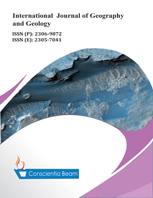Geographical Analysis of Household Waste Generation and Disposal in Taraba State, Northeast Nigeria
DOI:
https://doi.org/10.18488/journal.10.2019.82.58.68Abstract
Household wastes have become one of the greatest menaces in the world over, and the situation in developing countries such as Nigeria has become pathetic. The goal of this paper is to examine the nature of household solid waste generation, collection and methods of disposal in Jalingo, Taraba State, Nigeria. The data for this study was collected through primary and secondary sources. The Primary data sources include; field work, questionnaire and personal observation. The secondary sources of data were obtained from the ministry of Environment Jalingo, for a period of ten (10) years (2000-2013). A set of 200 carefully coded questionnaires were distributed, this was done to elicit responses from respondents. Analysis of variance (ANOVA) technique was employed in the examination of the statistical significance of the variation among the selected area of study. From our results, 56.5% of respondents are female while 43.5% of respondents are male. The study revealed that a large proportion (47%) of Jalingo residents dump their wastes at refuse disposal points in their neighborhoods, 35% dump their wastes in any available open land while 5 and 8% dump their wastes in streams and drainages respectively. The study concluded by noting that household waste is not properly managed in jalingo and therefore recommends that policy makers are required to identify and distinguish between the day time and official population in Jalingo and use the statistics as a basis for planning.

